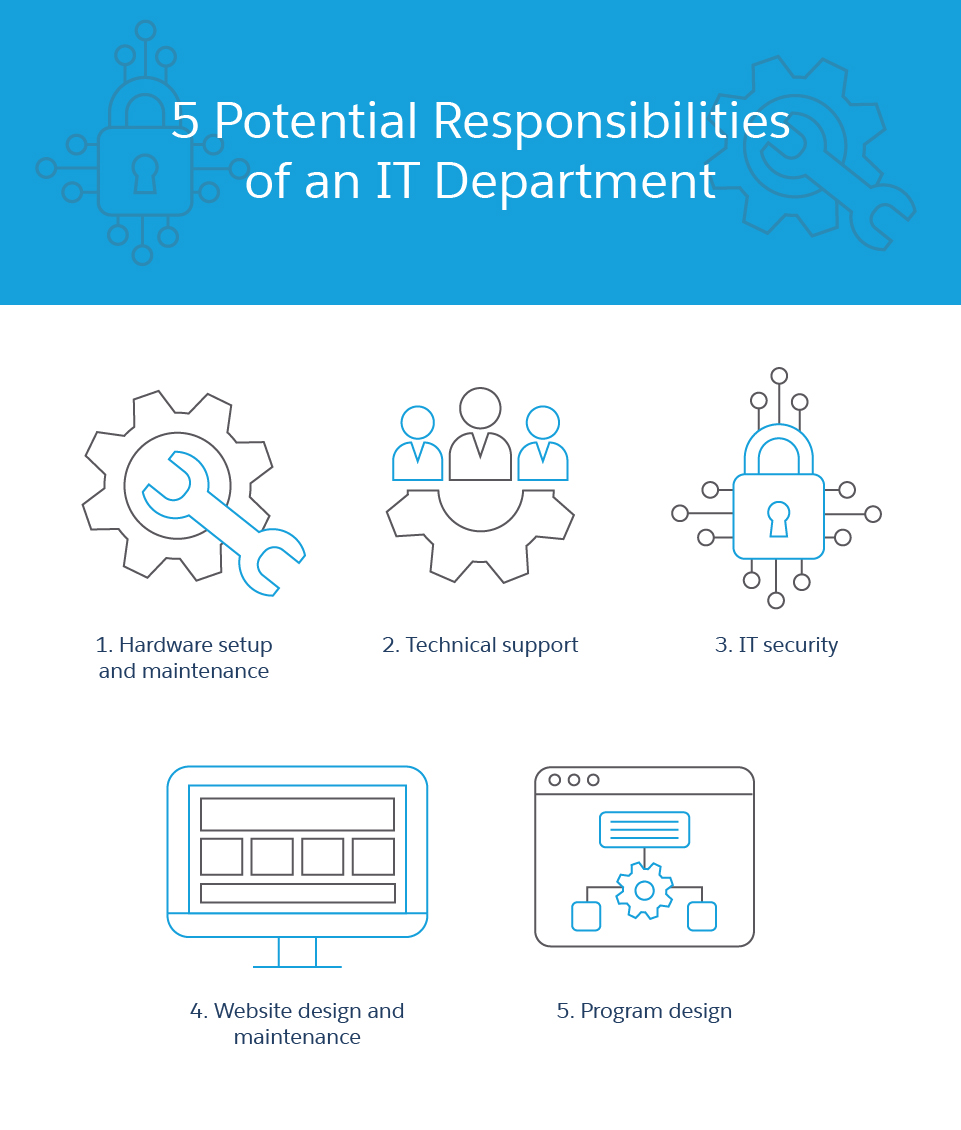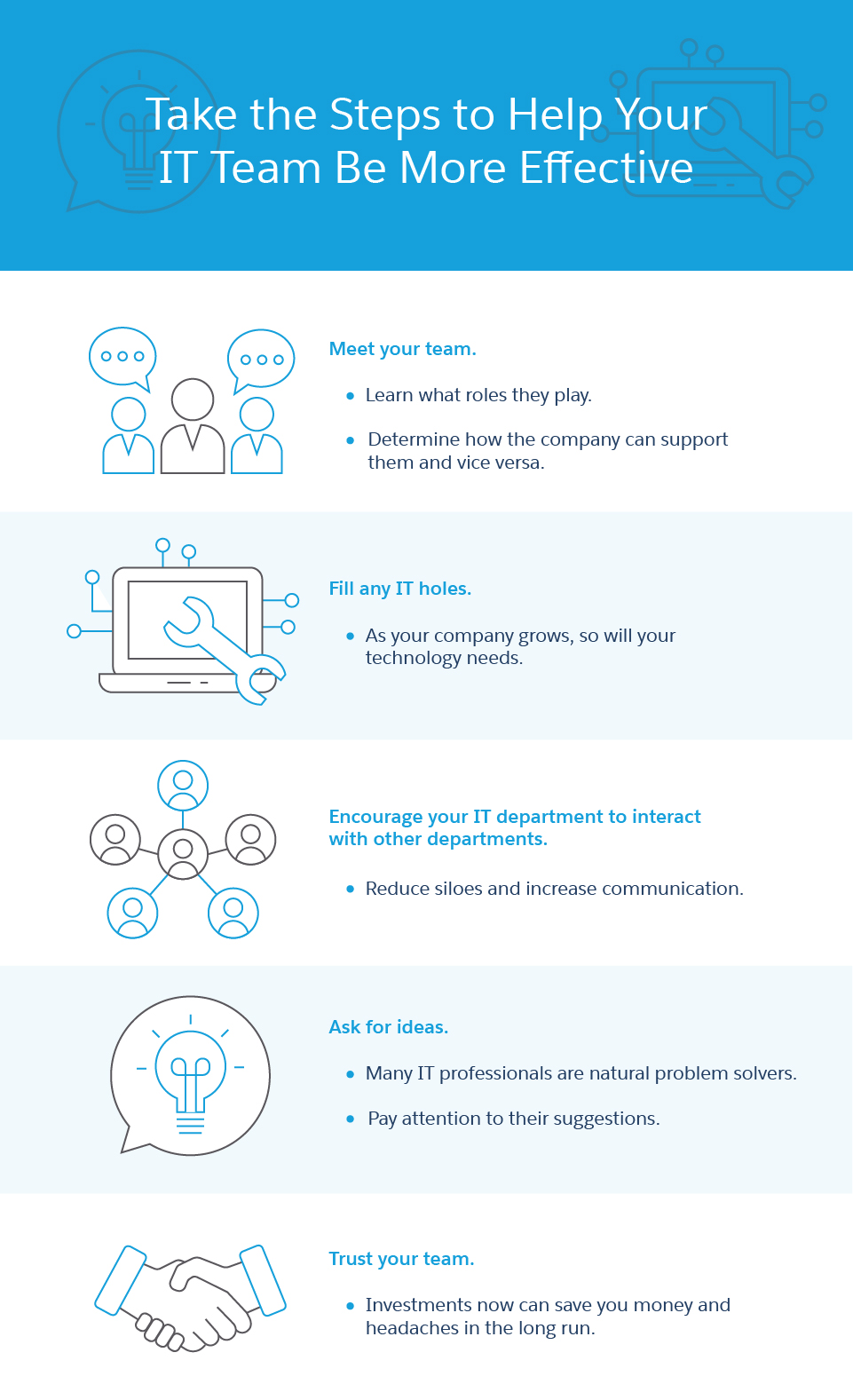When the printer breaks or the company website goes down, it’s time to get help from the IT department. Too often, however, the appreciation for the IT team stops there. Many company leaders have little or no idea what their IT department does, or, more importantly, what their information technology team is capable of.
Technology is an integral part of every business, which makes the IT department central to your business’s success. Today’s most successful companies recognize that the IT team can be a proactive rather than a reactive force within a company, and supporting it helps build a strong and secure technology support system that increases company productivity and efficiency.
What Does Your IT Department Do?
“Every business is a tech company,” says Nathan Turner, a Lead System Engineer who works for ClearBalance®, a company that works with healthcare organizations to provide financing patients can use to cover their out-of-pocket medical costs. “If your business has a phone system, a website, an online store,” he continues, “heck, if your employees use email, then you’re a tech company, and you need an IT department to keep everything running.”
Most company leaders recognize the need for an IT team, but they seldom understand exactly what their IT professionals do all day. In part, this confusion is the mark of a successful IT department. In explaining the value of IT, Jobs.net explains, “It’s apparent that not all the IT department does is apparent — it creates and maintains so many systems that go unseen or unrecognized by employees.”
The fact that your computer has been running without a problem all year or that the company website continues processing orders without a hitch means your IT department is doing its job. However, it can be difficult for non-technologically minded managers to fully recognize this effort, which can lead to an IT department being undervalued.

Another reason why so many company leaders aren’t exactly sure what their IT team does is because information technology is a huge umbrella that encompasses a wide array of positions, responsibilities, and job titles. From customer service to software programming, website development, network administration, and, yes, fixing the printer, your IT team does a lot of different things for your company.
Without getting too lost in the technological weeds, here are some of the primary responsibilities and services your IT team handles.
Hardware Setup and Maintenance
Perhaps the most visible responsibility of the IT department is to monitor and maintain all of the equipment that helps your business run, including its computers, laptops, phone systems, servers, printers, and more.
If something breaks, IT is called in to fix it. Additionally, your IT team can recommend the right equipment to your company, set up systems for your new employees, and update and maintain equipment so that it lasts as long as possible.
Technical Support
If your product or service includes a technology component, you’ll need to hire a team of tech support specialists who help your customers set up their systems and can fix any problems that pop up along the way. Your customers will inevitably vary in their comfort levels with technology, so your tech support team needs to be patient, thorough, and able to address a wide array of potential problems.
IT Security
Even as the importance of your technological infrastructure grows, so do the risks. In just one year, 2019, we saw data breaches at Toyota (3.1 million records affected), Evite (10 million records affected), and Facebook (540 million records affected). Additionally, a wave of ransomware attacks has crippled companies, institutions, and cities across the U.S. and Canada, including taking down the computer systems of three hospitals in Ontario in October of 2019.
All signs indicate that these threats and breaches will continue to grow and happen, which is why it is critical for companies of every size to take cybersecurity seriously. Arguably, one of the most important jobs for your IT team is to keep your network and all of its components safe. This can mean anything from ensuring that your company’s equipment has the latest updates to educating employees not to open suspicious attachments or links.
Website Design and Maintenance
Your website is a critical business asset. Even if you don’t sell products or services directly on your website, it is still your primary online real estate where you can educate potential customers and capture valuable leads. For brands that do sell online with an ecommerce store, your website is a profit-creating machine.
Your website design team can build a customized site from scratch and then grow and adapt your site as needed. Want to add a new product to your online store? Your web team can handle it. Need to promote a seasonal sale? Your web team can work with your marketing team to create a big banner for your home page. Your website designer and SEO team, working with your IT department, can assist in optimizing your website, making it easy for customers to find you online and navigate your site.

Program Design
It may seem obvious that traditional technology companies such as Google, Facebook, and Amazon need a large team of programmers to constantly work on, update, and innovate their services and products, but traditional companies also benefit from having programmers on their team. Programmers can develop customized applications for internal and external use or modify your existing programs to better serve your unique needs. For example, if you invested in a Salesforce platform, a dedicated programmer on your staff can easily create tailored reports, applications, and project flows within the system.
How to Optimize Your IT Department
These are just some of the important responsibilities your IT department handles in your company. With them in mind, how can you make sure you’re using your team’s full capabilities?
Meet Your Team
If you’ve never really thought about what your IT department does, make the effort to find out. Sit down with your IT manager and get to know the different people on the IT team and what roles the play in your company. By understanding the team, you can determine new and exciting ways they can support your company — and how your company can better support them.
Fill Any IT Holes
IT encapsulates a wide array of roles and responsibilities. Small businesses may be able to get away with having a single IT person on staff, but as your company grows, so will your technology needs. Make sure you bring in the right amount of support for your IT infrastructure. If you’re not sure which IT roles you need filled in your company, then it may be time to hire a dedicated IT manager, VP of technology, or CTO (chief technology officer).
Encourage Your IT Department to Interface with Other Departments
Your IT department shouldn’t be sequestered from the rest of your company. Instead, invite team members to work with and alongside your other departments and promote the cross-pollination of ideas and capabilities. When you reduce silos and your IT team understands the goals and operational needs of different departments, they may be able to offer unique technological solutions that your other teams would have never imagined.
Consider encouraging your IT manager to sit in on department meetings to offer advice and feedback from a technological perspective. Their input may be invaluable to the capabilities and growth of your company.

Ask for Ideas
IT professionals are problem solvers by nature. They likely have tons of ideas when it comes to improving systems and efficiencies in your company. All you have to do is ask.
Sit down with your managers and IT team and invite them to share ideas for improving the company. Your programmers, software engineers, support personnel, and network engineers are “on the ground” every day interacting with your networks, website, and customers. They may provide a number of great suggestions to help your company work better.
Trust Your IT Department
The best way to support your IT department is to trust them. Your IT employees know which systems your company needs, what equipment you’re missing, and the security measures you should invest in. Too often, management doesn’t spend the money to follow through on suggestions from IT, which can be a costly mistake in the long run. For example, investing in a security audit may cost money in the short term, but if it prevents a ransomware attack, it could help save your business.
If your computers are humming along, your network is secure, and your website is working well, then that means your IT team is hard at work, even if most everyone else doesn’t notice. Your IT department is an incredible and crucial resource for your company. Tap into that resource and give your IT department the tools and support they need to help your company thrive.
Share "Beyond the Help Desk: How IT Keeps a Business Running" On Your Site



